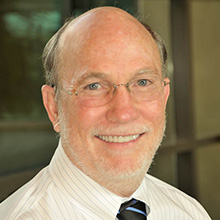Dr. Robert Lanford Receives Baylor College of Medicine Distinguished Alumnus Award

San Antonio (April 26, 2017) – Dr. Robert Lanford, Texas Biomedical Research Institute Scientist and Director of the Southwest National Primate Research Center, is being honored tomorrow, April 27, with the Distinguished Alumni Award by the Baylor College of Medicine Alumni Association. The Award recognizes individuals for their excellence among peers of Baylor.
Dr. Lanford earned his Ph.D. in 1979 and completed his postdoctoral work at Baylor College of Medicine in the lab of Dr. Janet Butel, now the Distinguished Service Professor of Molecular Virology and Microbiology at Baylor and former chair of the department. Dr. Lanford served as an Assistant Professor in the Department of Virology and Epidemiology until 1984 when he came to the Southwest Foundation for Biomedical Research now known as Texas Biomedical Research Institute.
Establishing the hepatitis research program at Texas Biomed, Dr. Lanford has contributed significant advancements to understanding viral hepatitis, which causes inflammation of the liver that can progress into cirrhosis or liver cancer. For more than 30 years, Dr. Lanford has focused on developing treatments for viral hepatitis. His efforts included pre-clinical trials in non-human primates for therapies for hepatitis C (HCV) and hepatitis B (HBV), some of which progressed to human trials and approved therapies.
Between 130-150 million people are chronically infected with HCV alone, according to the World Health Organization, and about 700,000 people die each year from HCV-related liver diseases. His early work helped characterize the immune response to HCV infection and helped establish models necessary to understand HCV infection when it was a poorly understood virus. His work has facilitated the development of drug cocktails that now cure chronic HCV infection in humans.
For the past three years, Dr. Lanford has served as the Director of the Southwest National Primate Research Center where he oversees administrative, scientific and animal care operations. SNPRC is part of a national network of only seven NIH-supported Centers that conducts and enables studies that make breakthrough discoveries of causes, preventions, treatments and cures possible.
“It is an honor to be recognized among my peers for my life’s work,” Dr. Lanford said. “One of the most significant events in my scientific career was being accepted into the graduate program of Baylor College of Medicine and having Dr. Janet Butel as my mentor.”
Dr. Butel wrote in her letter of support, “Dr. Robert Lanford is a creative, thoughtful and innovative researcher whose work has contributed significantly to basic science and human health.”
In addition to his current position, Dr. Lanford has had numerous professional roles. He teaches at the University of Texas Health Science Center and has served on many scientific advisory boards, including the South Texas Blood and Tissue Center and Abbott Laboratories, among others. He has organized multiple international HBV and HCV symposia. Dr. Lanford is a prolific author with more than 160 scientific papers published and has served as an NIH peer reviewer since 1987. He has served on the editorial board of Virology and is co-founder the journal Viral Immunology.
“I feel it is important to emphasize that Dr. Lanford is an extremely amiable and generous individual. This is exemplified by the longevity of his research group; four of his lab members have been with him for over 25 years,” noted Texas Biomed Staff Scientist Dr. Christopher Chen in his nomination letter for Dr. Lanford. “I believe Baylor should be proud of Dr. Lanford’s integrity driven pursuit of scientific advancement and his contributions to the fields of virology, hepatology, and non-human primate research.”
###
Texas Biomed is one of the world’s leading independent biomedical research institutions dedicated to advancing health worldwide through innovative biomedical research. Texas Biomed partners with hundreds of researchers and institutions around the world to develop vaccines and therapeutics against viral pathogens causing AIDS, hepatitis, herpes, hemorrhagic fevers and parasitic diseases responsible for malaria and schistosomiasis. The Institute also has programs in the genetics of cardiovascular disease, diabetes, obesity, psychiatric disorders and other diseases. For more information on Texas Biomed, go to www.TxBiomed.org.